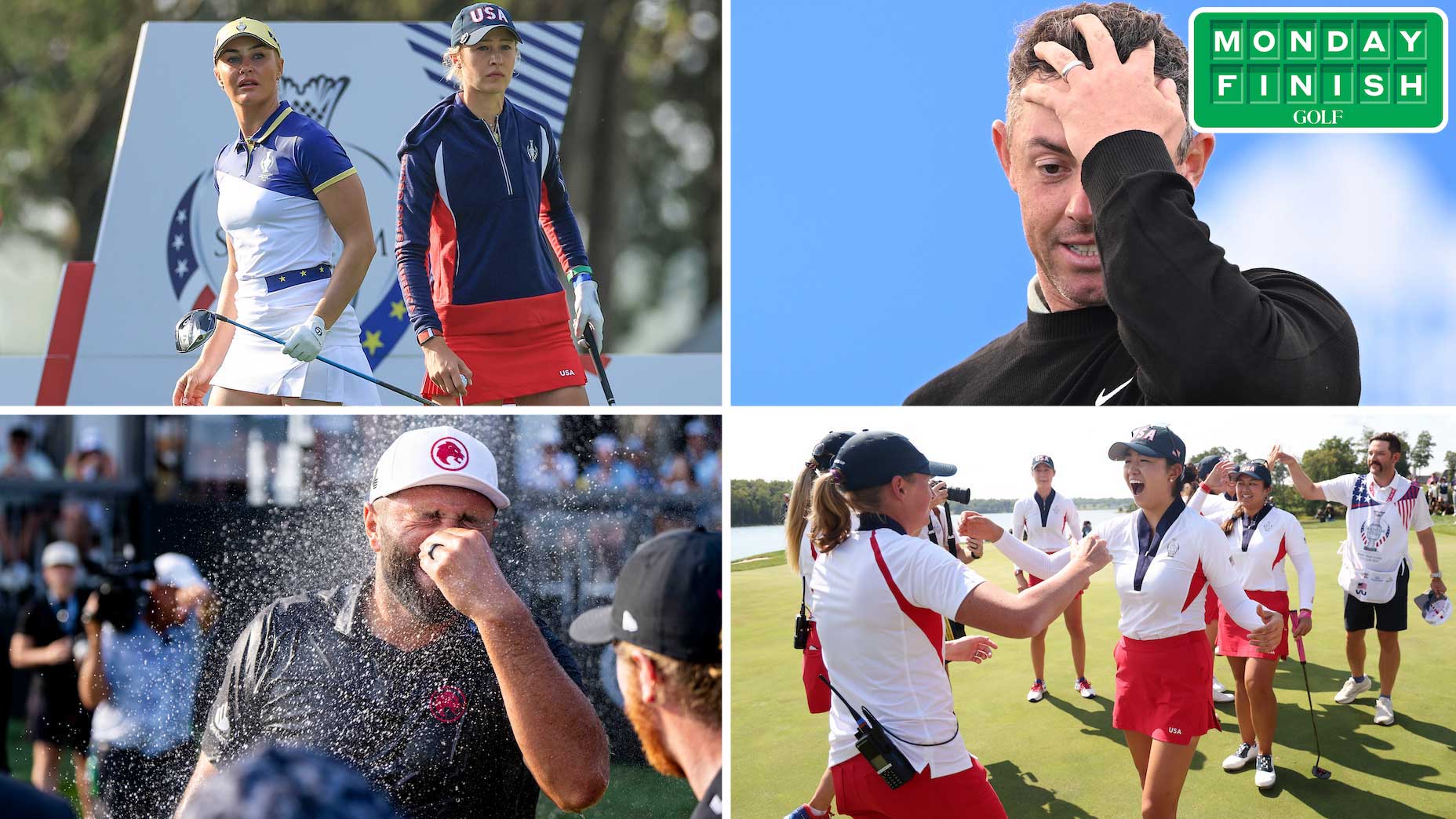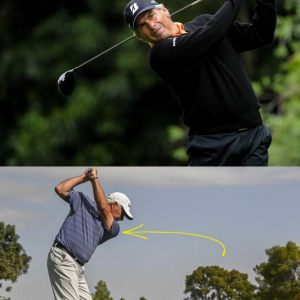Welcome to the Monday Finish, where we’re still waiting for golf’s “offseason” to hit. Maybe next week? To the news…
First, a quick request: If you like the Monday Finish, subscribe HERE to get it in your email inbox! It’s free. And it would make me happy.
GOLF STUFF I LIKE The loneliness of the arena.
As Rory McIlroy walked up the 18th fairway at Royal County Down on Sunday afternoon, thousands lined the hole, Irish lads and lasses, shouting encouragement, filling in the fairway behind him, hoping to lift him to a miracle finish. McIlroy had just suffered tremendous misfortune when his chief competition, Rasmus Højgaard, had holed a bunker shot at No. 17 for an incredibly unlikely birdie. McIlroy then brought further pain on himself, three-putting from 25 feet at No. 17 just minutes later. His two-shot lead from an hour before was suddenly gone, now transformed to a two-shot deficit with one hole to play. The round wasn’t yet over but already you could feel echoes of McIlroy’s high-profile near-misses gone by. His three-putt at 17 echoed his three-putt at No. 16 at the U.S. Open earlier this summer. The throngs of Northern Irish fans urging him along echoed the cries of those who’d tried to carry him in vain to a missed cut at Royal Portrush a half-decade ago.

McIlroy’s only remaining hope was to eagle the par-5 18th to force a playoff, and so he pummeled the longest drive of the day, some 345 yards down the fairway. And then he walked in the direction of that drive, balancing the shell-shock of what had just happened with the determination to make something still happen, to produce something that would send the crowd home happy. The announcer, wonderfully understated, offered the perfect assessment.
“Somehow looks lonely, amidst all that support,” he said.
I thought about that line the rest of the golfing day. This week’s Irish Open and Solheim Cup felt particularly convivial, like events for the golfing collective, best experienced together. In County Down, just 30 miles from McIlroy’s Northern Irish hometown, fans rallied around their local golfing hero at their local golfing paradise as he chased what he said would be “up there with one of the biggest” wins of his life. In Virginia, just 30 miles from the nation’s capital, crowds rallied around their U.S. team as they chased redemption, looking to recapture the cup for the first time in four tries. But mostly that togetherness was happening outside the field of play. The fans, the families, the teams, the rooters. Inside the ropes? If you were the golfer in that position, there were entire tournaments and even entire mini-economies leveraged on what you, the individual, did down the stretch. Sixteen or seventeen holes of good swings only elevates the pressure on the final few. It was lonely as ever. And that’s partly why it was special.
This loneliness isn’t the only beauty of golf; there are others. There’s the elemental beauty of Royal County Down, ultimate linksland, arguably best in the world, set dramatically at the meeting of land and sea and hill. There’s the strategic beauty of team match play, who to pair and how to play off each other. But mostly the beauty of golf is the beauty of individual competition under the gun, of stepping inside the ropes and leaving yourself vulnerable to the euphoria of a heroic win (think Lilia Vu‘s putt on 17 and her approach on 18, or Hojgaard’s hole-out at 17 and birdie at 18) or the devastation of a heartbreaking loss (think McIlroy’s eagle putt, hanging out wide). The loneliness is the point.
Teddy Roosevelt‘s been quoted a million times in sportswriting; a million and one won’t hurt. In his iconic speech about the Man in the Arena, he described that man in this way: “…who at the best knows in the end the triumph of high achievement, and who at the worst, if he fails, at least fails while daring greatly, so that his place shall never be with those cold and timid souls who neither know victory nor defeat.“
The triumph of high achievement and, even in failure, the pride that comes with daring greatly — that’s golf stuff I like.
WINNERS
Who won the week?
The U.S. team won the Solheim Cup 15.5-12.5, triumphing for the first time in four cups and seven years.
Rasmus Hojgaard won the Irish Open, the biggest of his five career DP World victories, climbing to No. 63 in the world and ensuring he can join his brother Nicolai on the PGA Tour next season.
Patton Kizzire won the Procore Championship, the first event of the PGA Tour’s FedEx Fall, earning his first victory in six years and valuable PGA Tour status in the process.
Jon Rahm won LIV’s Chicago event as well as LIV’s season-long order of merit, finishing off an impressive debut season with top-10s in every event that he finished (a dozen top-10s plus one WD).
Steve Stricker won the Sanford International for the third consecutive season, hitting the flagstick on the fourth playoff hole to set up a winning birdie.
If you like the Monday Finish, subscribe for free HERE to get it in your email inbox!
NOT-WINNERS
Who didn’t win?
If you’re looking for final form pre-Presidents Cup, here’s how the six competitors in action at this week’s Procore fared:
Mackenzie Hughes finished T4, including a second-place showing in strokes gained from tee to green; that’s encouraging.
Corey Conners was T7 just behind his countryman; he was second in the field off the tee and gained strokes putting, both encouraging signs ahead of next week.
Min Woo Lee, the third and final International teamer, finished T32, let down by a cold putter on the weekend.
For the Americans, Sahith Theegala finished T7, his second strong tournament in a row, and gained strokes in every category.
The good news stopped there. Max Homa missed the cut by a shot; he needed birdie at the par-5 18th to make the weekend and made bogey instead. Wyndham Clark finished three shots behind Homa.
SHORT HITTERS
The best and worst from the Solheim Cup, in brief.
The best on the U.S. side? There were a lot of contenders. Rose Zhang was 4-0-0 and smashed statistical records for the most dominant showing. Lauren Coughlin continued the fairytale season of her life and handled the pressure of her home Cup, going 3-0-1. And even though she lost her singles session Nelly Korda played three team sessions of nearly flawless golf and looked more relaxed than we’ve seen her on the course. That was thanks to Megan Khang, who went 3-0-0 and was the fiery emotional center of the team, too. Shoutout to Andrea Lee, too, who went 2-0-1.
The best on the Euro side? Charley Hull gets that title; she played all five sessions and beat Korda leading off Sunday singles. Only one other player — Madelene Sagstrom, who went 2-1-0 — had a winning record, though Celine Boutier, Anna Nordqvist and Georgia Hall each went 2-2-0.
The worst on the U.S. side? It was a disappointing week for Ally Ewing, who went 0-4-0 and has now sadly lost seven consecutive Solheim Cup matches. And Lexi Thompson‘s perfect Solheim Cup finish slid by when she lost her singles match at No. 18, capping off a 1-3-0 week. All good in victory, though.
The worst on the European side came from Linn Grant, who was a shocking 0-4-0 after going 3-2-0 in her debut last year. Carlota Ciganda also couldn’t quite get going and slipped to 1-3-0 on the week. But even worse than that was the strife and second-guessing that comes with any losing team; in this case Leona Maguire, who entered in middling form but with a 7-2-1 Solheim record, was understandably gutted to play just one of the four team sessions and made that clear. She won her singles match to go 1-1 for the week.
The event’s best was its atmosphere; the matches were lined with enthusiastic fans and the entire thing felt big. Its worst was its Friday morning logistics, a failure so significant it was hard to fathom how they happened. Also, the no-realtime-scoreboard thing drives me nuts.
ONE DUMB GRAPHIC
Best golf bros.
ONE SWING THOUGHT
You’ve gotta get it there. Kinda.
Every time I watch one of these team match-play competitions I get irrationally frustrated watching the best players in the world hitting must-make putts and absolutely hammering them through the break and like, five feet past the cup. In match play it’s easy to get obsessed with the idea that you “have to get it there,” which is true, but if you take that to the extreme you run into two problems:
1. You’re putting differently than you usually do, so you’ll mess up the break.
2. You make the hole effectively smaller by hitting the ball too hard; the hole is biggest at dying speed.
This will upset me again next week at the Presidents Cup, I’m sure.
ONE BIG QUESTION
How much do LIV guys make?
For once we actually have an answer here, too. After Jon Rahm claimed the season-long $18 million bonus on Sunday, Joaquin Niemann got $8 mil for second and Sergio Garcia earned $4 mil for third, LIV released its player year-to-date earnings including season-end payouts. Here’s how that top 10 looks:
1. Jon Rahm, $34.75 million
2. Joaquin Niemann, $24.38 mil
3. Sergio Garcia, $17.09 mil
4. Tyrrell Hatton $11.63 mil
5. Brooks Koepka $11.57 mil
6. Dean Burmester $8.37 mil
7. Cameron Smith $8.08 mil
8. Louis Oosthuizen $8.06 mil
9. Abraham Ancer $7.44 mil
10. Carlos Ortiz $7.39 mil
How does that compare to the PGA Tour? You’ve probably read by now that Scottie Scheffler earned more than $62 mil, so his historic season has him well out in front. But No. 2 Xander Schauffele made $23.2, right in line with Niemann’s second-place earnings. And the Tour hands out more money to more guys; 40th on the LIV list is Danny Lee at $2.36 mil while Cam Davis made over $4 mil in the same spot on the PGA Tour’s list. The LIV guys make a ton of money, they do so in fewer events and many got beefy signing bonuses. But it turns out the PGA Tour is giving out some big-time cash, too.
One big question to leave you with, then: How much did Rahm actually get for going?
ONE THING TO WATCH
Royal County Down.
I love Ireland, so perhaps I’m biased — or perhaps I just have proper judgment. The Irish Open rules. And Royal County Down rules. What a scene at 18.
NEWS FROM SEATTLE
Monday Finish HQ.
Summer officially comes to a close at week’s end, but one thing that’s already noticeable this time of year is just how much darker it gets every day. After the Solstice in mid-June, one day to the next we only lose a few seconds of light. This time of year, though, we’re losing three minutes every day. It accelerates. That adds up fast; right now we’re losing like 20 minutes every week. That means you can really start to feel it as we get slingshotted around this corner of the calendar and 9 p.m. sunsets are an increasingly distant memory.
Bundle up, gang. Fall golf is on the doorstep.
Before you go, a quick request: If you like the Monday Finish, subscribe for free HERE to get it in your email inbox!





